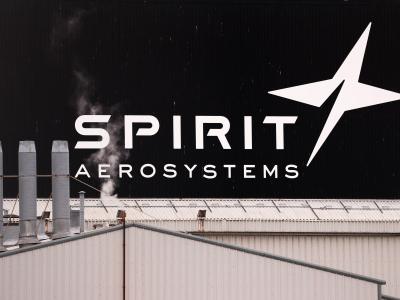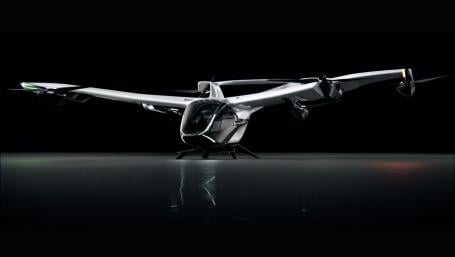Podcast: Spirit AeroSystems' Sam Marnick Discusses The Company's Business Aviation Sector
Spirit AeroSystems is diversifying and growing its business aviation segment of business. In 2020, the commercial aircraft aerostructures supplier purchased Bombardier’s historical Short Brothers operation in Belfast, Northern Ireland, which expands its expertise business jet portfolio. What does the move mean for the company and what are its plans for growth in the business jet segment?
Don't miss a single episode. Subscribe to Aviation Week's BCA Podcast in Apple Podcasts, Google Podcasts, Amazon, Audible and Spotify.
Rush Transcript
I'm Molly McMillin bringing you today's BCA Podcast by Aviation Week. I'm here at Spirit AeroSystems in Wichita speaking with Sam Marnick, the company's Executive Vice President and Chief Operating Officer and President of Spirit's Commercial Aviation Division. Good morning, Sam.
Sam Marnick:
Good morning, Molly. Welcome to Spirit.
Molly McMillin:
Thank you. Thanks for meeting with us. As you all may know, Spirit AeroSystems is the largest aerostructure supplier in the aerospace industry, building portions of all Boeing aircraft, it's history in Wichita here, including the fuselage in the Boeing 737 MAX single aisle aircraft here in this plant where we are sitting today. As such, you can see the 737 fuselages cross the city by train on their way to Renton, Washington. That's always a really cool sight. In 2020, Spirit acquired the assets of Bombardier Short brothers operations in Belfast, Northern Ireland, and in doing so, accelerated the company's goal to diversify its business. So that's a pretty long wind up, but Sam, I wanted to talk to you about entering the business aviation industry. Could tell us about the acquisition, and why you were attracted to this operation in Belfast.
Sam Marnick:
Absolutely, Molly. So this was a very exciting acquisition for us on a number of fronts. If you think about the context for this, going through and following through with this acquisition and our diversification strategy in such a complex environment, the downturn, COVID, and everything else, tells you how strategic it was for us. There are a number of reasons that we were very attracted to the business. The first was the work on the A220 wing. This is a fully integrated composite wing. We think that program is a phenomenal program for the future. We think that technology is phenomenal, and places us well for next generation aircraft. Very excited about the A220 program. But in addition to that, that site in particular has a very rich history in business aircraft. A skill set that complements ours, but also slightly different than ours.
Sam Marnick:
As you know, you know this factory very well here in Wichita, we're used to the large aircraft, large volumes, high velocity production of big aircraft. And the Belfast operation has equally the same kind of expertise in the business aviation market. So very, very skilled in that arena, not only from the traditional structures of fuselage and wing and tails and those types of things, also like [inaudible 00:02:34] propulsion. So [inaudible 00:02:35] reverses in the cells, et cetera, as well. So that piece is as well. A couple of other added benefits as well, so that really got us into the mind to the business aviation market. Couple of other areas that were really good for us. One was its aftermarket business. So we also had a small aftermarket business here. Our desire was to grow it quickly overnight. This helped us double our aftermarket business. And it was kind of similar, but opposite. We're very Boeing focused here in aftermarket, that Belfast operation was more Airbus focused. They were more repair focused. So that was a great combination, a great add to us.
Sam Marnick:
And then the last thing, and this was kind of like a, I would say, perhaps a well-kept secret, or we didn't really understand the full greatness of this opportunity was, some of the defense work that the Belfast site was working on for the UK defense. So very complex. Again, akin skills and technologies that really added to our defense portfolio as well. It was an entry into a market there that we didn't realize at the time, and we weren't expecting. Overall though, I would say the other thing that attracted us was like-mindedness, if that makes sense. So when we looked at the Bombardier aerostructures business, we were pleased to see, we felt confident because the skill sets, the approach, the culture was similar. And when you think about those difficult times doing a large acquisition, integrating such an acquisition, having the thought that these people kind of work the same way that we do, really helps with that decision process. So all in all, very, very pleased with the acquisition. We were very excited about it and really pleased we were able to follow through.
Molly McMillin:
Oh, and you mentioned the history of that operation, and that went all the way back to the Short brothers, which is really cool. Can you just talk a little bit about, it went back to the Wright brothers?
Sam Marnick:
Yes. Before my time.
Molly McMillin:
Mine, too. Just for the record.
Sam Marnick:
So Short brothers, originally they made balloons in the late 1800s, from what I understand. And then early 1900s, when the Wright brothers, with the Wright Flyer, were getting that out there, the Short brothers quite entrepreneurially got the Wrights to produce the Wright Flyer there in Belfast. So from, I think it was 1908, they started to produce the Wright Flyer. Now, what I would say is if you... And an open invitation to you, Molly, to come visit our Belfast factory, but in our main meeting room, in Belfast there, there's this glass case, and there's this book, and it's written plans for Wright Flyer. It's phenomenal to see. In this case, there's such an old piece of aerospace history, and you can see old notes on it and everything. That's really cool to look at. So yeah, very, very rich history.
Molly McMillin:
Wow. That is awesome. In the acquisition, you acquired an operation in Casablanca, and also an aftermarket operation in Dallas that came with it. Is that right?
Sam Marnick:
That's absolutely right. Yeah.
Molly McMillin:
What work do they perform there, those two sites?
Sam Marnick:
So I'll talk about the Dallas one first, and that Dallas operation as an aftermarket, like you said, and so that's folded into our Dallas operations. Well, actually that came first, and we added to the Dallas operations for our aftermarket. So they do repair work. They're doing control services now, [inaudible 00:05:58], the kind of repairs that we do on Boeing and Airbus programs, predominantly. That was a great addition to that. The Casablanca operation, this is really a jewel. Very, very technical workforce, capable workforce, providing subassemblies into Belfast, predominantly. They're doing some really cool work right now. I was just there a few weeks ago on the A220 fuselage. So they're doing some pretty neat work out there, really great work for us. It does add to our low cost footprint as well.
Molly McMillin:
So with the Belfast facility, you have now [Bombardier] Challenger and Global work, that big picture with sphere, what kind of business aviation work do you do now? Kind of on a [crosstalk 00:06:41]
Sam Marnick:
In its entirety. So in Belfast, it's phenomenal that we do both the Global series and the Challengers. So fantastic suite of aircraft there. With this acquisition, I think we became Bombardier's top supplier, lead supplier. So again, when we talk about the predominance of Spirit with OEMs, we are Boeing's leading supplier, I would imagine, or one of their leading suppliers. Airbus, particularly with the acquisition of this A220 wing add into our portfolio, and Bombardier. So that's a great stable to have. So in terms of the kind of product lines, like I said, with the Globals, and you've got the Challenger series. So we're doing things like fuselage, wings, like I said, propulsion systems, tails, horizontal stabilizers, all of the things that you'd expect in the structures kind of realm there. We're doing a lot of work for Rolls-Royce as well, which ultimately then serve business aviation aircraft there out of Belfast. Over here in the states, we have a yet to be announced program. So I'm excited when I can tell you more about that one.
Sam Marnick:
But the one that was announced just recently, where we work with Rolls-Royce is on the Falcon 10X, which is a very exciting aircraft. So we're working on that on the proportion side. We also do work for Rolls-Royce, which is a BR725, which ultimately serves the G650, and that's done here in Wichita. The Falcon 10X is also here in Wichita as well. So it's becoming a very nice portfolio of work, whether it's for the engine companies, whether it's for Pratt & Whitney, or Rolls-Royce, or it's direct to the OEMs.
Molly McMillin:
And that is an area that was at your Investor Day, where I think Tom Gentile [Spirit AeroSystems CEO] was saying that's an area that you want to continue to grow. And I think he gave some revenue figures with that at some point. Can you talk about what you see going forward in that area?
Sam Marnick:
Well, our aspiration here, what we said at the Investor Day, was over the next couple of years to get to a portfolio of about $500 million, plus a significant book of business, or a really good book of business in the commercial area. So that's our growth plan. We do see line of sight to that. We have a lot of confidence. If you look from a business development standpoint, there's a lot of activity in the market. Whereas commercial had some challenges over the last couple of years, it seems like civil business aircraft market held its own, I would say. I'm not saying it went wildly up, but there's definitely new aircraft contemplated, and there's definitely work, then I think that's first in a really good position to go out and win from others.
Molly McMillin:
Spirit is also looking at emerging markets, right?
Sam Marnick:
Yes.
Molly McMillin:
Can you talk about what your plans might be there?
Sam Marnick:
Yeah. Again, got to respect some programs that are yet to be announced, but yeah, this is a really exciting market. So if you just Google, you'll see all of the work, all of the different companies that are jumping into it. So you've got startup, you've got the big names, like Airbus. Big names, small names, you've got a lot of funding going into this arena, and there's a lot of work being done. And I know your organization has lot of study in this area as well. But where will it end up? Who will remain in the game? All of that is yet to be determined, right? It's all of this in the polls. What I'm really proud to say is Spirit's working on those that are on the top of the list here, in terms of those that you're looking at, factoring in Q1 at one related interesting piece of work we did announce was our partnership with Airbus.
Sam Marnick:
And that was on CityAirbus NextGen's prototype where we're working on the wing [inaudible 00:10:21]. Super exciting one to get announced on. I think this is a really strong market for Spirit to be planning because this plays to what we're good at. So we can bring aerospace, very proven expertise to this market, which is much needed. But this is another platform for us to apply our engineering technical capabilities, to bring technologies to some of this aircraft that then can even be eventually scaled up to commercial volumes, or applicable into the defense market as well. So this is a really good, not only the market itself, but a test bed for those types of endeavors as well. So we're really excited about it. We're watching closely because it's not just a defined... There's all sorts of variations in the aircraft, and how the FAA [inaudible 00:11:13] certain different types of aircraft. So, it's exciting to watch these different fields emerge in that arena.
Molly McMillin:
I think we're getting almost to the end of our time. Do you have anything you'd like to add or say?
Sam Marnick:
I think just in closing on the business aviation side, it was traditionally not something where Spirit focused, but it's becoming a very important part of our portfolio. It's a very intentional acquisition of the Bombardier aerostructures business. So Spirit Belfast, Spirit Morocco, and Spirit Dallas, great additions to the team. And I think it makes Spirit even stronger going forward.
Molly McMillin:
You're definitely a global company for sure. Thank you so much, Sam, for your time today, and your information. So that's a wrap for this edition of Aviation Week's BCA Podcast. So thank you again, Sam, for joining us. And thank you all for listening. You can subscribe to the BCA Podcast in Apple Podcast, Google Podcast, Amazon, Audible, and Spotify. Join us again soon for another episode.







